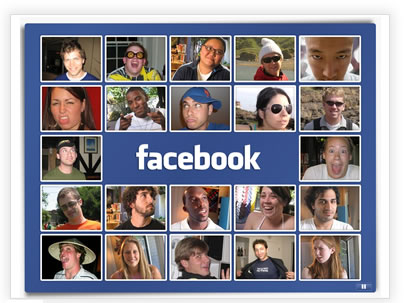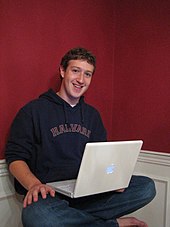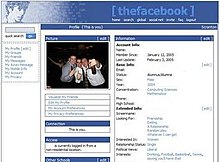|
|||||||
Facebook (Online Social Networking website Full Details) |
 |
|
Views: 11853
|
Thread Tools |
Rating: 
|
|
|||||||
Facebook (Online Social Networking website Full Details) |
 |
|
Views: 11853
|
Thread Tools |
Rating: 
|
|
#1
|
||||||||||||||||||||||||||||||||||||
|
||||||||||||||||||||||||||||||||||||

Similar Threads:
|
||||||||||||||||||||||||||||||||||||
|
#2
|
|||
|
|||
|
History
 
|
|
#3
|
||||||||||||||||||||
|
||||||||||||||||||||
|
Company
 Facebook's homepage features a login form on the top right for existing users and a registration form directly underneath for new visitors. Users can create profiles with photos, lists of personal interests, contact information and other personal information. Communicating with friends and other users can be done through private or public messages or a chat feature. Users can also create and join interest groups and "like pages" (formerly called "fan pages" until April 19, 2010), some of which are maintained by organizations as a means of advertising. To allay concerns about privacy, Facebook enables users to choose their own privacy settings and choose who can see what parts of their profile.[65] The website is free to users and generates revenue from advertising, such as banner ads.[66] By default, the viewing of detailed profile data is restricted to users from the same network and "reasonable community limitations".   Profile shown on Thefacebook in The media often compares Facebook to MySpace, but one significant difference between the two websites is the level of customization.[68] MySpace allows users to decorate their profiles using HTML and Cascading Style Sheets (CSS), while Facebook only allows plain text.[69] Facebook has a number of features with which users may interact. They include the Wall, a space on every user's profile page that allows friends to post messages for the user to see;[70] Pokes, which allows users to send a virtual "poke" to each other (a notification then tells a user that they have been poked);[71] Photos, where users can upload albums and photos;[72] and Status, which allows users to inform their friends of their whereabouts and actions.[73] Depending on privacy settings, anyone who can see a user's profile can also view that user's Wall. In July 2007, Facebook began allowing users to post attachments to the Wall, whereas the Wall was previously limited to textual content only.  Over time, Facebook has added features to its website. On September 6, 2006, a News Feed was announced, which appears on every user's homepage and highlights information including profile changes, upcoming events, and birthdays of the user's friends.[74] This has enabled spammers and other users to manipulate these features by creating illegitimate events or posting fake birthdays to attract attention to their profile or cause.[75] Initially, the News Feed caused dissatisfaction among Facebook users; some complained it was too cluttered and full of undesired information, while others were concerned it made it too easy for other people to track down individual activities (such as changes in relationship status, events, and conversations with other users).[76] In response to this dissatisfaction, Zuckerberg issued an apology for the site's failure to include appropriate customizable privacy features. Since then, users have been able to control what types of information are shared automatically with friends. Users are now able to prevent friends from seeing updates about certain types of activities, including profile changes, Wall posts, and newly added friends.[77] On February 23, 2010, Facebook was granted US patent 7669123 on certain aspects of their News Feed. The patent covers News Feeds where links are provided so that one user can participate in the same activity of another user.[78] The patent may encourage Facebook to pursue action against websites that violate the patent, which may potentially include websites such as Twitter |
|
#4
|
|||
|
|||
|
One of the most popular applications on Facebook is the Photos application, where users can upload albums and photos. Facebook allows users to upload an unlimited number of photos, compared with other image hosting services such as Photobucket and Flickr, which apply limits to the number of photos that a user is allowed to upload. During the first years, Facebook users were limited to 60 photos per album. As of May 2009, this limit has been increased to 200 photos per album.
Privacy settings can be set for individual albums, limiting the groups of users that can see an album. For example, the privacy of an album can be set so that only the user's friends can see the album, while the privacy of another album can be set so that all Facebook users can see it. Another feature of the Photos application is the ability to "tag", or label users in a photo. For instance, if a photo contains a user's friend, then the user can tag the friend in the photo. This sends a notification to the friend that they have been tagged, and provides them a link to see the photo.   Facebook mobile graphical user interface Facebook Notes was introduced on August 22, 2006, a blogging feature that allowed tags and embeddable images. Users were later able to import blogs from Xanga, LiveJournal, Blogger, and other blogging services. During the week of April 7, 2008, Facebook released a Comet-based[86] instant messaging application called "Chat" to several networks,[87] which allows users to communicate with friends and is similar in functionality to desktop-based instant messengers. Facebook launched Gifts on February 8, 2007, which allows users to send virtual gifts to their friends that appear on the recipient's profile. Gifts cost $1.00 each to purchase, and a personalized message can be attached to each gift. On May 14, 2007, Facebook launched Marketplace, which lets users post free classified ads.[90] Marketplace has been compared to Craigslist by CNET, which points out that the major difference between the two is that listings posted by a user on Marketplace are only seen by users that are in the same network as that user, whereas listings posted on Craigslist can be seen by anyone. On July 20, 2008, Facebook introduced "Facebook Beta", a significant redesign of its user interface on selected networks. The Mini-Feed and Wall were consolidated, profiles were separated into tabbed sections, and an effort was made to create a "cleaner" look. After initially giving users a choice to switch, Facebook began migrating all users to the new version beginning in September 2008. On December 11, 2008, it was announced that Facebook was testing a simpler signup process. On June 13, 2009, Facebook introduced a "Usernames" feature, whereby pages can be linked with simpler URLs such as Many new smartphones offer access to the Facebook services either through their web-browsers or applications. An official Facebook application is available for the iPhone OS, the Android OS, and the WebOS. Nokia and Research in Motion both provide Facebook applications for their own mobile devices. |
|
#5
|
|||
|
|||
|
Reception
As of April 2010, according to The New York Times, countries with most Facebook users are the United States, the United Kingdom and Indonesia.[120] Also in early 2010, Openbook was established, an avowed parody website (and privacy advocacy website)[121] which enables text-based searches of those Wall posts which are available to "Everyone," i.e. to everyone on the Internet. Impact  
|